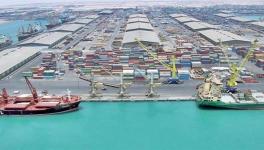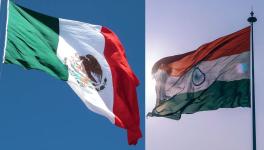India Needs Independent Foreign Policy to Exert Influence in Afghanistan
It is not surprising that India’s participation in the Troika Plus initiative meeting on Afghanistan with the Taliban in Moscow last week has not yielded the desired results. The ministry of external affairs (MEA) has not issued a statement on the discussions held with the Taliban except for India being party to the joint statement issued after the meeting.
The Indian representatives, who held a separate meeting with their Taliban counterparts in Moscow, raised concerns over the maintenance of peace, security and safety, and respecting the rights of Afghan minorities, women and children. They also sought safe passage for stranded Indians as well as those who wish to travel to India for education, medical treatment or other purposes. In return, New Delhi offered humanitarian assistance to Kabul and better diplomatic relations with the Taliban regime.
A Taliban spokesperson has yet again assured that Afghan soil would not be used for terrorism in any way. Though the Taliban has said that the issues raised by India and other nations would be sincerely addressed, there are no signs of any concrete action being taken to fulfil such assurances. The Taliban takeover is a deeply disturbing development given its reactionary and fundamentalist character. Considering the experience of its previous rule, a lot would depend on how the new Taliban regime deals with the concerns voiced by India and the United Nations Security Council at its meeting last month.
While the United States is part of the Troika Plus, which also comprises the foremost stakeholders in Afghanistan—Russia, China and Pakistan—it opted out of the Moscow meeting at the last minute due to “technical reasons”, a development which has raised eyebrows. The Troika Plus had earlier met in Doha in August on the sidelines of the Taliban talks to discuss the then-evolving situation in Afghanistan. India was not part of those deliberations though it had already opened backchannel talks with some Taliban leaders besides hosting a formal meeting attended by the Indian envoy in Qatar, Deepak Mittal.
At that formal meeting on August 31 too, the Indian side had focussed on safety, security and early return of Indians stranded in that country besides allowing Afghan nationals to travel safely to India for education, medical or other purposes. India had also stressed that Afghan soil should not be used for anti-Indian activities and terrorism in any manner. At that time too, the MEA had said Taliban representative Sher Mohammad Abbas Stanikzai, now Afghanistan’s deputy foreign minister, had “assured the ambassador that these issues would be positively addressed”.
India was earlier reluctant to hold open talks with the Taliban as it could damage its relations with the erstwhile Afghan government, led by Ashraf Ghani. Besides, New Delhi also believed that the Taliban was merely a proxy of its main regional rival Pakistan in Afghanistan. But with a Taliban government in place in Kabul, India seemed to have been caught in a bind and was forced to open backchannel deliberations with the militant group.
This is a crucial policy shift for New Delhi, which had so far refrained from establishing a permanent communication channel with the Taliban. It was last September, when the government started officially attending the intra-Afghan peace dialogue in Doha. Since then, Indian security officials opened up channels of communication with several Taliban factions that were perceived as being “nationalist” or outside the sphere of influence of Pakistan and Iran.
India seeks to gain from these backchannel communications to protect its security interests and investment in Afghanistan following the hasty US exit. More importantly, it wants to make sure that Kashmiri militant outfits like Lashkar-e-Taiba (LeT) and Jaish-e-Mohammad (JeM) do not use Afghanistan as a staging ground to launch attacks in Jammu and Kashmir.
It is no secret that the Pakistani Army and its Inter-Services Intelligence have used the Taliban to target Indian assets in Afghanistan. Besides, JeM and LeT could get a safe haven in that country. Such backchannel talks could ensure that Kabul does not transform into a big security threat for New Delhi in the years to come.
On the other hand, the Taliban can also gain from such parleys with India. It would need significant outside help to achieve its development and reconstruction goals. India can provide this help in exchange for security guarantees.
However, the success of India’s backchannel communications with the Taliban will depend on Pakistan’s response. While Islamabad at best could choose to stay neutral, it could also move to isolate the Taliban elements talking to India. But even if Pakistan’s opposition hinders these parleys, such attempts would not necessarily end the process. Only time will tell whether such efforts will succeed in bringing much-needed security and stability to the region.
New Delhi will find itself in a difficult position at such deliberations as, historically, it has had no significant influence over the Taliban. India has always been firmly opposed to the outfit and expansion of its influence in Afghanistan. The fact that the Afghan Taliban is now a major force cannot be ignored. If Indian policymakers do not recognise this fact and keep considering the Taliban to be merely a Pakistani proxy, it will misjudge the real situation in Afghanistan, which could hamper the advancement of India’s strategic interests.
Indian policymakers should also keep in mind that Moscow and Beijing may be wary of New Delhi’s position, which is virtually tied to Washington’s interests in this region. The hurried withdrawal of US and NATO troops has left Indians and Indian projects exposed to danger. India becoming a strategic ally of the US has virtually undermined its capability to strongly pursue an independent foreign policy. Further, India’s current anti-Pakistan and anti-China approach has left it practically isolated in the regional context.
If India wants to exert its influence in Afghanistan or expand its presence there, it needs to maintain its position of strategic autonomy and adopt an independent foreign policy. Its focus should be to promote peace and stability in Afghanistan and ensure that its investment in major development projects, such as the Salma Dam (the Afghan-India Friendship Dam), transmission lines, highways or schools and hospital buildings, are not hampered. Besides strengthening its own communication channels with the Taliban regime, New Delhi should continue to participate in global multilateral mechanisms to handle the Afghan issue while tackling the practical threats from outfits like JeM and LeT.
(Amitabha Roychowdhury has extensively covered internal security, defence and civil aviation for the Press Trust of India. The views are personal.)
Get the latest reports & analysis with people's perspective on Protests, movements & deep analytical videos, discussions of the current affairs in your Telegram app. Subscribe to NewsClick's Telegram channel & get Real-Time updates on stories, as they get published on our website.
























